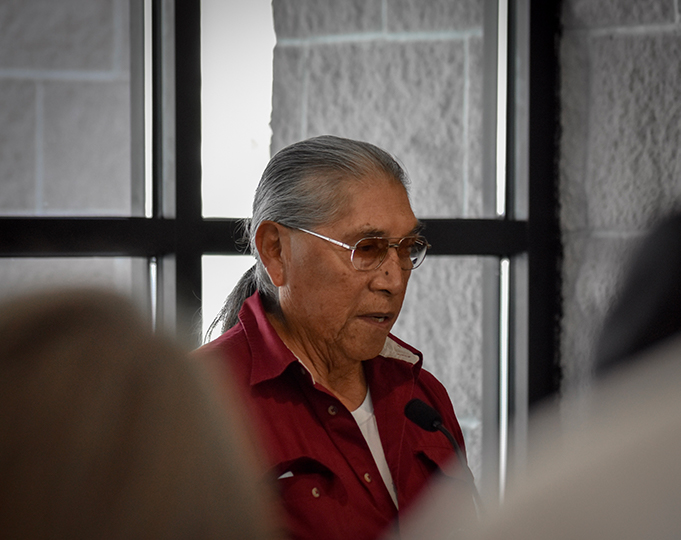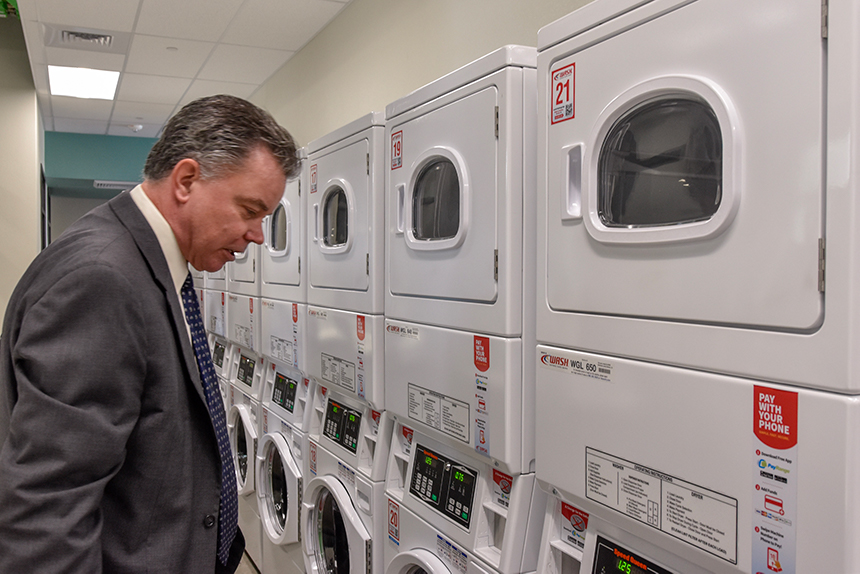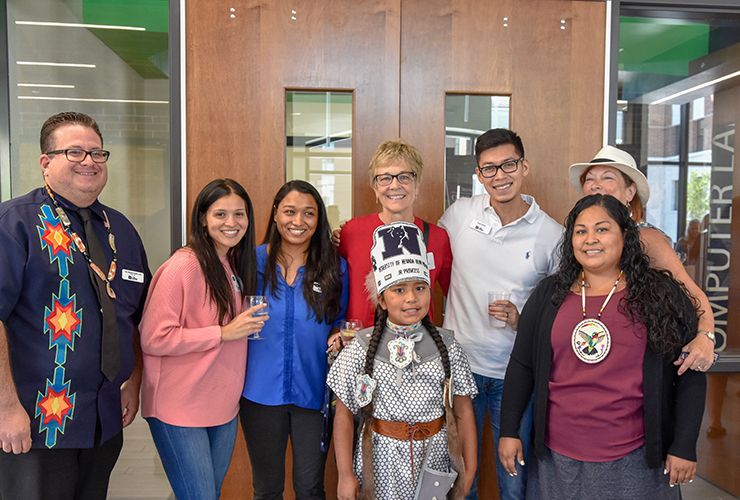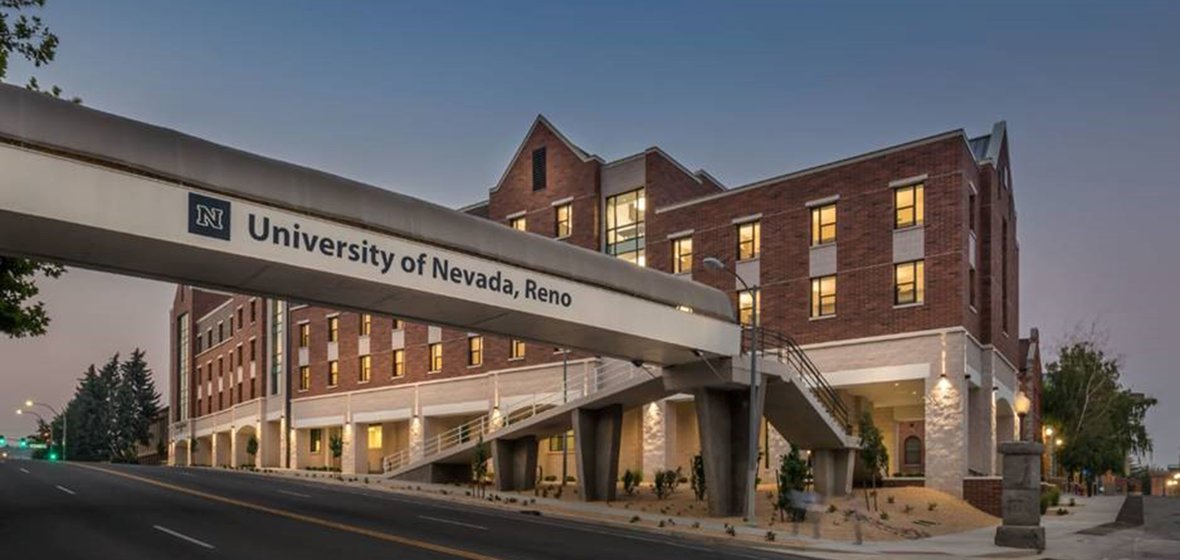Great Basin Hall, the University's newest 400-bed residence hall, opened Thursday, Aug. 16, 2018. The residence hall will begin welcoming students for the Fall 2018 Semester Saturday, Aug. 18.
Led by Vice President of Student Services Shannon Ellis, the grand-opening event included remarks from University President Marc Johnson and Nevada System of Higher Education Regent Cathy McAdoo. Some of the key messages around the hall's opening were: the University's commitment to sustainability, the fostering of a campus community, providing a space for STEM-specific students and the significance of its naming.
"Through the naming of Great Basin Hall, the University of Nevada, Reno recognizes the traditional homelands of the indigenous peoples of Nevada and acknowledges the tribes of the Great Basin who historically and currently reside in the state of Nevada: Newe (Western Shoshone), Nuwu (Southern Paiute), Numu (Northern Paiute) and Wa She Shu (Washoe)," Ellis said. "Great Basin Hall will incorporate indigenous art and in the near future, the University will be developing partnerships that focus on increasing native students in the STEM disciplines."

Ralph Burns, a Pyramid Lake Paiute elder, offering a blessing to the new residence hall.
"In 2019, we are going to start a program in indigenous studies; our focus on diversity and building programs for Indigenous Peoples is paramount," President Johnson said. "Diversity, inclusion and equity are fundamental values to this campus. It is important that we learn to consider the values and ideas that are a reflection of the backgrounds our students bring with them."
In recognition of these efforts, Pyramid Lake Paiute elder, Ralph Burns offered a blessing during the opening ceremony. The blessing was followed by an honor song from the Five Feathers Drum group from Pyramid Lake, Nevada.
Background
Designed by VanWoert Bigotti Architecture, a Reno-based firm that also designed the William N. Pennington Health Sciences Building at the University, Great Basin Hall is environmentally friendly. Intended to be a Gold LEED building, the 114,000 square-foot residential hall features energy-efficient mechanical systems, LED lighting, low water-flow fixtures, recycled materials and large windows to maximize natural light.
Dedicated to environmental sustainability, University policy states that all new campus buildings are required to satisfy LEED Silver equivalency. Over the past decade, every new building - a list that includes major projects such as the Joe Crowley Student Union, Mathewson-IGT Knowledge Center, the Center for Molecular Medicine and the William N. Pennington Student Achievement Center - has been built to the equivalent of LEED Silver standards. Great Basin Hall is projected to be the second University building to earn a Gold LEED Certification, the first being Peavine Hall.

Provost Kevin Carman checked out some of the new facilities within Great Basin Hall.
Built to complement the architectural design of historic Lincoln Hall, which is adjacent to the new building, Great Basin Hall will feature a 24-hour computer lab and innovation lab for project designs, television and quiet-study lounges on every floor, laundry and vending facilities as well as a satellite location for the Nevada Wolf Shop.
Construction for the new residence hall began in fall 2016 and was completed earlier this summer. Funded through residence hall fees, the total cost for the new building was $65 million.
A Need for More Housing
Great Basin Hall was built to keep up with the increasing demand for on-campus student housing, which exceeded 122 percent before the new hall opened. While the University is able to accommodate all current residence hall requests, new facilities are needed to increase capacity and continually improve on the quality of accommodations offered to new students.
This semester alone, University Residential Life received a 50 percent increase in applications for student housing and saw more returning student applications than ever before.

Dean Debra Moddelmog and The Center Staff pose for a picture with some community members during the grand-opening event.
"We have long envisioned a campus living community that is wholly woven into the life of our campus, and I think we have realized this vision," President Johnson said. We will have about 3,400 students living on campus this semester - that's up from about 2,900 in 2017. Great Basin's 400 beds not only meet a need - they represent our ongoing institutional commitment to the academic and personal success of our students."
Peavine Hall, which opened in August 2015, helped absorb capacity lost by the closing of Lincoln Hall and Manzanita Hall: expanding from double to triple occupancy to accommodate 600 students. Serving as a replacement for White Pine Hall, removed in February 2016, the new residence hall is designed to accommodate approximately 400 students, 90 percent freshmen and 10 percent upperclassmen with primarily suite-style living arrangements. Its predecessor, White Pine Hall, housed an estimated 120 students.
The Importance of STEM
Great Basin Hall will be home to students who are interested in the disciplines of science, technology, engineering and mathematics (STEM). This STEM-themed, residential community will provide students with an informal mentoring system in an effort to recruit and retain students in the STEM fields.
"Fundamental to this whole living experience is mentoring," President Johnson said. "Here, upperclassmen can take these younger students under their wings and assure that the initial principles they are learning in the STEM disciplines hold. Through this, these lower-classmen can be certain in themselves and their interest in these fields."
In addition to being a STEM-themed residence hall, Great Basin Hall will feature a living learning community: WISE, Women in Science & Engineering. Designed for first-year women majoring in science, mathematics or engineering, the WISE living-learning community will provide opportunities for women to build personal and professional networks that last a lifetime.
"The University's Women in Science and Engineering program is encouraging and developing our next generation of female scientists, mathematicians and engineers," Regent McAdoo said. "I have every confidence that the young people who live here will also develop the kind of generosity of spirit, attentiveness, engagement and quest to serve our communities that marks all of our greatest leaders."
Freshmen who live on and connect with campus in their first year at the University are more likely to persist, re-enroll into their second year and ultimately graduate. Providing students with a quality, on-campus living experience helps showcase the culture of student success fostered at the University. Living on campus provides students with an authentic, total college experience.
"Great Basin Hall isn't just a residence hall, but rather a community where students will come together to discover their passions alongside new ideas and take advantage of the countless opportunities this institution offers," Ellis said. "This is one important aspect of the University of Nevada, Reno learning experience that seeks to prepare our students to take on the tough problems of today and the important issues of the future.












